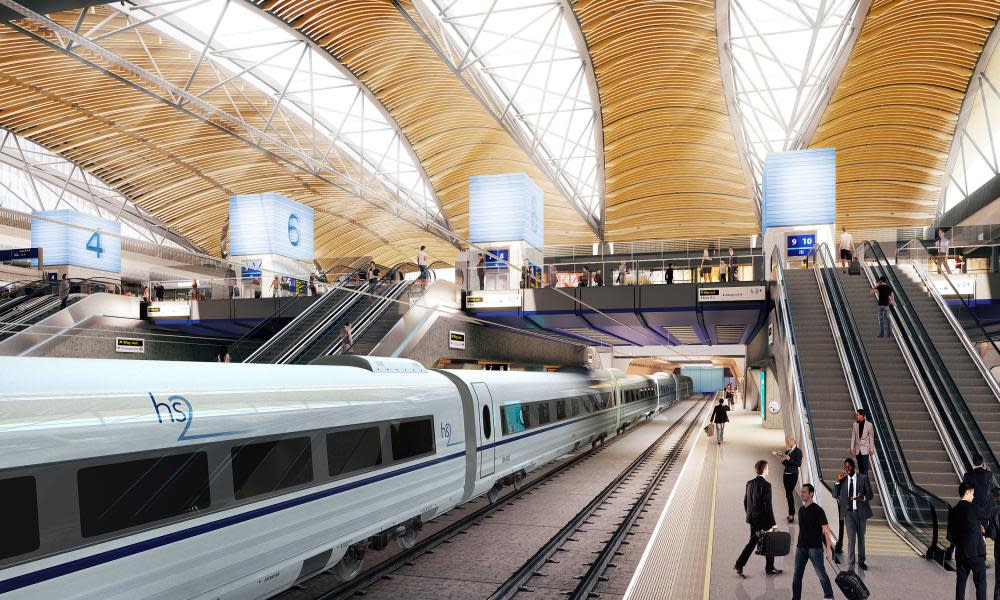HS2: service held for 60,000 to be exhumed at Euston burial ground

Protesters against the HS2 rail link have joined clergy in a memorial service to mark the impending exhumation of 60,000 bodies and the felling of 100 century-old trees around Euston station in London.
The service was held behind construction hoardings in St James’ Gardens, a former cemetery, that has been sealed off for station development to serve the £55.7bn HS2 high-speed rail network.
Anne Stevens, vicar of St Pancras church, who conducted the memorial service, said they were “taking the opportunity to pray for the living as well as the dead” as local residents now face years of disruption.
Burial records show that up to 61,000 people may have been buried during the 18th and 19th centuries in the park and archaeologists will excavate the area before work begins on the station.
An HS2 spokesman said they would “ensure that we treat the site with dignity, respect and care”. Discussions are ongoing with the Archbishops’ Council, the local parish and Historic England over exactly where to reinter the remains.
Notable figures buried under the park include Matthew Flinders, who circumnavigated and named Australia, Bill Richmond, the American-born boxer who became one of the first black sporting superstars, and Lord Gordon, who incited sectarian riots in London in 1780.
Residents have been told to expect major disruption for 10 of the next 17 years, with additional noise and air pollution affecting homes and the church’s local primary school. Stevens added: “You think of the children there and their entire childhood is going to be blighted by this project. Any green space is going to be taken up by construction sites.”
St James’ Gardens was closed in June and will eventually be part of the western entrance to an enlarged Euston station, with six new platforms for high-speed trains to be constructed to the west of the London terminus.
Patsy Downey, 75, has lived in the Euston area since 1961 when she came from Ireland to work at the National Temperance Hospital, which is also being demolished for HS2. She said: “My children and grandchildren played in St James’ Gardens – it was a little haven in the middle of Camden. It’s incredible what they’re doing to save half an hour on a train journey. I’m living in the middle of a building site already. It’s a sad day.”
Protesters were crocheting scarves to wrap around more plane trees due to be felled in another threatened green space, Euston Square Gardens, which will largely disappear in 2018.
One protester and church warden, Dorothea Hackman, said: “This level of destruction in our local community, if it were in the national interest I’d grit my teeth. But HS2 has got no economic case, and if the government were serious about the Northern Powerhouse, they would electrify the railways there. I run the local food bank and we have 50 different households every week coming in, absolutely desperate. The money going on HS2 is unconscionable.”
Joe Rukin, of Stop HS2, said: “The worst thing is that HS2 only want some of these spaces for temporary possession: the trees are just in the way of the trucks. It’s environmental vandalism.”
The HS2 spokesman said: “We will replace every tree with others in other sites. We will also restore some open spaces after construction.”
He added: “HS2 will connect eight out of our 10 biggest cities, increase rail capacity on the current system and reduce journey times, while also creating thousands of jobs and acting as a catalyst for economic growth across the UK. At Euston, our work will triple the number of seats out of the station at peak hours and help to create a gateway to the capital and the nation that the local community and travelling public can rightly call their own.”
Construction contracts worth almost £7bn were awarded in July, with major engineering work starting along the HS2 route from London to Birmingham next summer. The second phase of the network, running north on branches via Leeds and Manchester, will be completed by 2033, but work around Euston will continue throughout the project as the demand on the London terminus expands.
The first disruption will be felt by travellers this bank holiday weekend, with Euston station closed entirely for two days.

 Yahoo News
Yahoo News 
